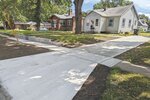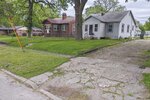YOUR BUSINESS AUTHORITY
Springfield, MO
YOUR BUSINESS AUTHORITY
Springfield, MO


“It only takes a spark to get a fire going …”
This scrap of a lyric from an old sing-along may evoke memories of candlelight ceremonies at the ends of campouts or church retreats, but it also hints at the thinking behind the Block Challenge Grant Program, now open for applications.
The program is the first initiative of Restore SGF, a nonprofit focused on rehabbing homes in Springfield’s older neighborhoods and increasing homeownership in the city.
Restore SGF is accepting applications on a rolling basis through Dec. 1 for the Block Challenge Grant Program, which encourages groups of neighbors to work together on exterior home improvements.
Neighborhood teams can consist of five to 19 members, with the stipulation that participants can see their next team member’s home from their front porch or a few steps beyond. Each participant takes on a project, be it painting, concrete work, landscaping, siding, roofing or window replacement, and upon completion, Restore SGF will reimburse the costs through the matching grant, up to $2,500 per group member. The project must be visible from the road, officials say.
The first round of funding is earmarked for homeowners in five areas: the neighborhoods of Woodland Heights, Grant Beach and Fassnight, plus part of Doling Park east of Robberson Avenue, and part of Meador Park east of National Avenue.
The hope expressed by the organization’s leaders is that seeing neighborhoods transform will provide a spark that will spread from house to house and block to block, ultimately transforming the city.
First effort
The grant program was announced at a ribbon-cutting event last month at Restore SGF’s new office, 1409 W. Sunshine St.
The program aims to create a chain reaction of improvements, according to Restore SGF board member and former Springfield City Councilmember Richard Ollis.
“We want to create and enhance complete neighborhoods, but most importantly, we want to promote homeownership, and we’d like to rehabilitate our historic neighborhoods,” Ollis said.
According to the program description, almost any exterior home improvement that can be seen from the street is eligible for reimbursement.
At the announcement, Ollis said the program is funded by investments from 10 financial institutions and Community Foundation of the Ozarks Inc. The loan fund totals $1.5 million. Finance partners are Arvest Bank, Mid-Missouri Bank, Commerce Bank, Great Southern Bank, Guaranty Bank, OakStar Bank, OMB Bank, Central Bank, Regent Bank and Legacy Bank & Trust Co.
Teams of five to nine members making improvements are eligible for up to $1,000 reimbursement per residential property or half of the eligible project costs – whichever is less. Larger teams of 10-19 members are eligible for up to $2,500 per residential property or half of the eligible project costs.
Interested teams can find application information at RestoreSGF.com.
Ollis said one of the appeals of the program was its ability to build momentum, as seen in Des Moines, Iowa, whose Invest DSM program provided the model for the local program.
“In Des Moines, we found that although it’s a one-for-one match, most people invested more in their home to get the match,” Ollis said. “In other words, it creates a lot more activity and investment than just the match.”
According to the Invest DSM website, in 2022, that city’s block challenge grant program had 11 teams and 109 participants. The total investment, including that of homeowners and the Invest DSM match, was $480,000. Program officials say every dollar spent by Invest DSM resulted in $1.54 spent by homeowners.
So far, Restore SGF Interim Director Dana Elwell said he has not received any applications for the program, but at this early stage, he said he and the organization’s 11 board members are working on getting the word out. He said he has found substantial interest in the community.
“We’ve had some calls and emails,” he said. “They need a little bit of time to apply.”
He added he has heard of several neighborhood teams that are forming, and he anticipates receiving two to three applications in the next week or two.
The Des Moines model
Amber Lynch is executive director of Invest DSM. She said the Des Moines block grant program launched in spring of 2020 – a propitious time, as it turned out, since many people were home during the pandemic.
“People were working from home, and naturally they started thinking about home improvement projects,” she said.
Lynch said there was an unexpected level of energy for people to come together in neighborhood groups and get to work on exterior improvements.
“We would have been happy with 50 programs that year, but we ended up doing 240,” she said. “It blew all of our expectations away.”
Over the past four years, she said 640 projects have been completed with over $2.5 million in total investment.
While the Springfield program is relying mostly on bank investments, Invest DSM is funded by the city of Des Moines and Polk County, where it’s located.
The organization also offers four other grant programs. There is an individual homeowner grant that covers interior and exterior improvements, as well as a program for landlords to rehab their rental properties. A program for developers encourages the renovation of homes for resale, and a commercial grant program is available for business owners.
The combined private and public investment in Invest DSM’s grant programs has been $24.59 million, Lynch said, including $18.65 million in private investment. In all, $3.15 has been leveraged from other sources for every dollar granted by Invest DSM.
Lynch noted she is happy to share program information with Springfield’s Restore SGF.
“They’ve been a fun group to work with,” she said.
She takes no credit for the idea of the block grant program, however. That, she said, came to Des Moines – population 212,000 – from Oswego, New York, with a population of 17,100.
The spark
Paul Stewart, a psychology professor at the State University of New York in Oswego, lit the first candle in the block grant program movement when he founded the Oswego Renaissance Association in 2013. But Stewart said the initial spark came from another source – author David Boehlke, who developed the healthy neighborhoods framework, a concept that says, in part, healthy neighborhoods need an image and identity, as well as neighbor involvement and investment.
Stewart said there are only about 6,000 houses in Oswego, a working-class city, but in 2022, over 180 homeowners and landlords completed its three grant programs – a block challenge grant, a grant specifically for house painting and another for improvements to parks, playgrounds and other common areas.
Unlike the Springfield and Des Moines programs, Oswego’s Renaissance Block Challenge applies to actual blocks – that is, streets bounded by two cross streets. In 2022, 18 blocks participated with the association matching up to $1,000 of each participant’s investment. In all, $561,817 was invested, bringing the 10-year total to $5.1 million in private investment in Oswego’s neighborhoods.
“It’s amazing – the effect that it has is so large for relative pennies on the dollar,” he said.
The association has an annual budget of only $150,000-$200,000, he said, and it’s funded by local foundations and strategic partners.
And it’s not just a monetary investment, he noted.
“It’s investing of yourself, in the broadest sense of the word – your time, your energy and some of your money,” he said.
As neighbors work together, they also strengthen community bonds, he said.
“It’s people on the ground, working with neighbors,” he said. “The folks who live there are the ones who can make or break where a block goes.”
Moseley’s Discount Office Products was purchased; Side Chick opened in Branson; and the Springfield franchise store of NoBaked Cookie Dough changed ownership.